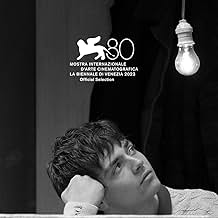Yurt
- 2023
- 1 Std. 56 Min.
IMDb-BEWERTUNG
6,8/10
1079
IHRE BEWERTUNG
Der zwölfjährige Ahmet ist am Boden zerstört, als sein neureligiöser Vater ihn in ein islamisches Wohnheim, eine Jurte, schickt, um muslimische Werte zu lernen.Der zwölfjährige Ahmet ist am Boden zerstört, als sein neureligiöser Vater ihn in ein islamisches Wohnheim, eine Jurte, schickt, um muslimische Werte zu lernen.Der zwölfjährige Ahmet ist am Boden zerstört, als sein neureligiöser Vater ihn in ein islamisches Wohnheim, eine Jurte, schickt, um muslimische Werte zu lernen.
- Auszeichnungen
- 15 Gewinne & 26 Nominierungen insgesamt
Esila Ergun
- Little Girl
- (as Esila Ergün)
Empfohlene Bewertungen
The story takes place in 1996 in Turkey, but the film is also a reflection on Turkey today, a very divided country, although the power dynamics has changed a lot.
The film fits many categories: a family drama, a story of class and religious struggle, a love story, and maybe most importantly a coming of age story.
The director was probably influenced by many films, one of them may have been Truffaut's 400 blows.
The relationship between Ahmet and Hakan is complex, beautiful and tormented. Contemporary films from Turkey are not afraid of addressing queer feelings and homophobia (Not knowing, Burning Days, and Black Night -Karanlik Gece-), and Yurt is a powerful contribution to this praise of sexual freedom.
The actors give an impressive performance and the photography is stunning. A real treat!
The film fits many categories: a family drama, a story of class and religious struggle, a love story, and maybe most importantly a coming of age story.
The director was probably influenced by many films, one of them may have been Truffaut's 400 blows.
The relationship between Ahmet and Hakan is complex, beautiful and tormented. Contemporary films from Turkey are not afraid of addressing queer feelings and homophobia (Not knowing, Burning Days, and Black Night -Karanlik Gece-), and Yurt is a powerful contribution to this praise of sexual freedom.
The actors give an impressive performance and the photography is stunning. A real treat!
10Alper-72
Yurt is truly an impressive and thought-provoking piece. It masterfully narrates a child's struggle to find themselves within the constraints imposed by society. Nehir Tuna's direction, atmosphere, and storytelling are highly successful.
In particular, the scenes reflecting Ahmet's inner world deeply affected me. On one hand, he is caught between his father's and society's expectations, and on the other, he begins to question the rules after meeting a freer character like Hakan. This internal conflict is portrayed very realistically. The anxiety, helplessness, and curiosity in Ahmet's eyes were palpable in every scene.
The film's way of depicting the environment of the dormitory, the pressure, and how individuality is disregarded was quite striking. The dark and oppressive tones perfectly matched the story's atmosphere. In some scenes, I truly felt as if I were inside that environment.
Additionally, the film subtly weaves in elements of the political atmosphere of the era. Details like Sevinç's use of the word "Aczmendi" remind viewers of 1990s Turkey and its conservative structure. These elements are integrated into the narrative in a natural flow, without being overly blatant.
While watching this film, I couldn't help but put myself in Ahmet's shoes. His internal conflict, the obligation to conform, and the burgeoning desire for freedom all felt incredibly familiar to me.
Ahmet's growth in an environment trying to box him in-caught between the desire to belong and the need to be free-reminded me exactly of my own experiences. That silence, the waiting to be understood without saying anything, questioning whether he is doing the "right" thing with every move he makes...
I was reminded that courage is contagious, but it also comes with a cost. In the final scenes, Ahmet's eyes perhaps showed for the first time that he truly understood things. At that moment, Ahmet was no longer present; I was.
Hakan's fate and Ahmet's inner journey seem to be left for the audience's interpretation. For some, this might appear as an unresolved ending, yet I believe it makes the message the film aims to convey even stronger.
In conclusion, Yurt is not just a coming-of-age story, but a film that questions the impact of society on the individual. It is definitely one of those productions that should be watched.
In particular, the scenes reflecting Ahmet's inner world deeply affected me. On one hand, he is caught between his father's and society's expectations, and on the other, he begins to question the rules after meeting a freer character like Hakan. This internal conflict is portrayed very realistically. The anxiety, helplessness, and curiosity in Ahmet's eyes were palpable in every scene.
The film's way of depicting the environment of the dormitory, the pressure, and how individuality is disregarded was quite striking. The dark and oppressive tones perfectly matched the story's atmosphere. In some scenes, I truly felt as if I were inside that environment.
Additionally, the film subtly weaves in elements of the political atmosphere of the era. Details like Sevinç's use of the word "Aczmendi" remind viewers of 1990s Turkey and its conservative structure. These elements are integrated into the narrative in a natural flow, without being overly blatant.
While watching this film, I couldn't help but put myself in Ahmet's shoes. His internal conflict, the obligation to conform, and the burgeoning desire for freedom all felt incredibly familiar to me.
Ahmet's growth in an environment trying to box him in-caught between the desire to belong and the need to be free-reminded me exactly of my own experiences. That silence, the waiting to be understood without saying anything, questioning whether he is doing the "right" thing with every move he makes...
I was reminded that courage is contagious, but it also comes with a cost. In the final scenes, Ahmet's eyes perhaps showed for the first time that he truly understood things. At that moment, Ahmet was no longer present; I was.
Hakan's fate and Ahmet's inner journey seem to be left for the audience's interpretation. For some, this might appear as an unresolved ending, yet I believe it makes the message the film aims to convey even stronger.
In conclusion, Yurt is not just a coming-of-age story, but a film that questions the impact of society on the individual. It is definitely one of those productions that should be watched.
Some films entertain, some impress, and a rare few reach directly into your life and show you a truth you hadn't yet found the words for. Yurt(The Dormitory), Nehir Tuna's hauntingly intimate debut, is one of those rare films. It is a quiet masterpiece-so precise in its storytelling, so understated in its emotion, and yet, somehow, so overwhelmingly powerful.
I watched Yurt and, for the first time in my life, felt as if a film had reached me not just as a viewer, but as a human being living through a particular place, time, and atmosphere. Every frame of this film breathes, pauses, and listens. It does not shout or beg to be noticed-it simply exists, fully and truthfully, in a way that feels more like memory than narrative.
The story follows a young boy sent to a religious dormitory, navigating the silence between belief and doubt, masculinity and vulnerability, discipline and desire. The setting-both literal and psychological-evokes suffocation, but never melodrama. Tuna's brilliance lies in his restraint. Instead of imposing judgment, he invites us to sit beside the boy, to see what he sees, feel what he feels, and above all, to remember.
Visually, the film is exquisite. The use of light and shadow is not just beautiful, but meaningful-it conveys everything that cannot be said aloud in this repressive environment. The color palette reflects the emotional state of its characters-faded, cold, sometimes harsh, sometimes warm enough to hint at the possibility of tenderness. Tuna has an exceptional eye, one that understands not only how to look, but when to look, and when to turn away.
What struck me most was how effortlessly the film communicated the complexity of growing up in a space where power, control, and religious ideology intertwine. There's no simplistic good vs. Evil here. Tuna treats each character-even the sternest authority figures-with a kind of compassionate distance. The dormitory itself becomes a metaphor for a society that demands conformity and punishes softness, but it's never reduced to just that. It's more than a symbol; it's a world-one many of us will find painfully familiar.
As someone who teaches a course on "Political Inclusion and Art" , It captures the nuances of our political and social reality without didacticism, without slogans, and with a depth that only great art can offer. It tells the story of a generation growing up under quiet, everyday pressures-expectations about who they should be, how they should feel, what they should believe. But it tells that story with care, patience, and immense artistic control.
Nehir Tuna is a filmmaker whose lens understands the youth of this country better than any political analysis. His gaze is not just observant, it is human. He does not dramatize suffering-he simply shows it, in its slow, real, and often invisible forms.
Thank you, Nehir Tuna, for making something so precise, so compassionate, and so needed. You've given us a story that lingers-and a silence that speaks louder than anything else.
I watched Yurt and, for the first time in my life, felt as if a film had reached me not just as a viewer, but as a human being living through a particular place, time, and atmosphere. Every frame of this film breathes, pauses, and listens. It does not shout or beg to be noticed-it simply exists, fully and truthfully, in a way that feels more like memory than narrative.
The story follows a young boy sent to a religious dormitory, navigating the silence between belief and doubt, masculinity and vulnerability, discipline and desire. The setting-both literal and psychological-evokes suffocation, but never melodrama. Tuna's brilliance lies in his restraint. Instead of imposing judgment, he invites us to sit beside the boy, to see what he sees, feel what he feels, and above all, to remember.
Visually, the film is exquisite. The use of light and shadow is not just beautiful, but meaningful-it conveys everything that cannot be said aloud in this repressive environment. The color palette reflects the emotional state of its characters-faded, cold, sometimes harsh, sometimes warm enough to hint at the possibility of tenderness. Tuna has an exceptional eye, one that understands not only how to look, but when to look, and when to turn away.
What struck me most was how effortlessly the film communicated the complexity of growing up in a space where power, control, and religious ideology intertwine. There's no simplistic good vs. Evil here. Tuna treats each character-even the sternest authority figures-with a kind of compassionate distance. The dormitory itself becomes a metaphor for a society that demands conformity and punishes softness, but it's never reduced to just that. It's more than a symbol; it's a world-one many of us will find painfully familiar.
As someone who teaches a course on "Political Inclusion and Art" , It captures the nuances of our political and social reality without didacticism, without slogans, and with a depth that only great art can offer. It tells the story of a generation growing up under quiet, everyday pressures-expectations about who they should be, how they should feel, what they should believe. But it tells that story with care, patience, and immense artistic control.
Nehir Tuna is a filmmaker whose lens understands the youth of this country better than any political analysis. His gaze is not just observant, it is human. He does not dramatize suffering-he simply shows it, in its slow, real, and often invisible forms.
Thank you, Nehir Tuna, for making something so precise, so compassionate, and so needed. You've given us a story that lingers-and a silence that speaks louder than anything else.
Dormitory
The film radiates corners, longing and monochromatic volumes. It is a heart where the blooming childhood enters in the forest of demarcations. The picturesque of black and white creates an enigmatic frame of emotions. It fleshes the character into the nuances of humanity of the bygone era and question about it. Promising frames, detailed costumes, classic editing, layered actors. The child Ahmets vulnerability, innocence and understanding goes through the tones of revolution. The film showcases an individual revelation of Godhood, companionship, parental relationships and openings of love.
Dormitory offers a compelling portrayal of a politically chaotic era, seen through the eyes of a young boy navigating his early teenage years. The film's intricate details stood out to me, particularly the metaphor of the rat, symbolizing the ego, and how it subtly intertwines with the narrative. I also admired the way rituals were adapted into the storyline, enriching the plot with cultural and symbolic depth. The casting was well-thought-out, with actors delivering performances that brought authenticity to the characters. The music was another highlight, complementing the film's atmosphere and emotional tone. The use of a black-and-white aesthetic, which transitions to color during a pivotal moment, was not only visually striking but also symbolically powerful, marking a shift in the protagonist's inner world. Overall, Dormitory encapsulates the shared struggles of boys growing up under the heavy weight of familial and societal expectations in a deeply religious community, making it a poignant and universally relatable story.
Wusstest du schon
- WissenswertesYURT is a Turkish-German-French co-production.
Top-Auswahl
Melde dich zum Bewerten an und greife auf die Watchlist für personalisierte Empfehlungen zu.
- How long is Dormitory?Powered by Alexa
Details
Box Office
- Weltweiter Bruttoertrag
- 86.322 $
- Laufzeit
- 1 Std. 56 Min.(116 min)
- Farbe
Zu dieser Seite beitragen
Bearbeitung vorschlagen oder fehlenden Inhalt hinzufügen









